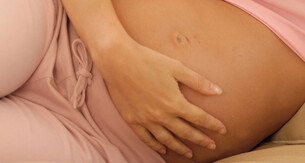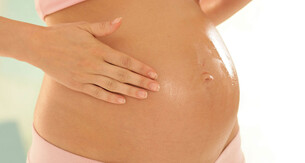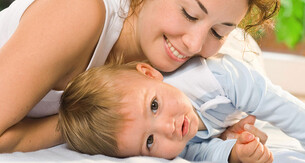Your baby is around 5 millimetres in size, and looks like a small green pea. Your baby is firmly embedded in your uterus and is comfortable in the amniotic sac. In week 7, they’re still very small compared with the space they have available.
Pregnancy weeks:
Week 7 of pregnancy: You can go for a check-up every four weeks from now on

Size of your baby in week 7
Your baby’s development
What it’s like for the mum-to-be in week 7
Top tips
Questions you may want to ask your doctor or midwife
In week 7, your baby is 5 weeks old and you’re midway through the second month and in the first trimester of your pregnancy.
Size of your baby in week 7

Your baby’s development
Your baby will be moving a lot, though their movements will be more like convulsions without any coordination. However, their coordination will improve over the next few weeks.
Their heart is beating quickly and powerfully at around 150 beats per minute, a remarkable effort which is needed so that they can handle all the processes going on in their body.
If you’re expecting twins, you’ll be able to see two separate hearts beating powerfully, although the doctor won’t yet be able to tell them apart as one of the tiny bodies will be behind the other.
Their arms, hands and legs are slowly beginning to take shape, and this stage is often called the “jelly baby” stage. An ultrasound will show small bulges on their hands, which will become their fingers.
Your baby’s tail will still be visible too, although it will disappear over the next few weeks once their legs and spine are fully formed.
Meanwhile, their face is beginning to form on their oversized head. Their eyes look like black dots, and you can see the opening for their mouth and their two nostrils. The latter are now small grooves, which will form openings as their nose develops at a later stage.
The placenta also continues to develop in order to keep pace with your baby’s growing needs and to make sure they get enough oxygen and nutrients from your body. In week 7, the placenta is half the size it will be by the end of your pregnancy and, by around week 14, it will be the same shape, size and weight as it will be when you give birth.
What it’s like for the mum-to-be in week 7
Most pregnant women experience symptoms as a result of hormonal changes in their bodies during the first trimester. Depending on the severity of the symptoms, there’s a lot you can do to boost your wellbeing in week 7.
If the symptoms are getting you down, you can look forward to them easing and disappearing completely by the third month. From then on, pregnant women usually feel much better and more optimistic.
Common signs and symptoms
Sore breasts
Your breasts are beginning to get bigger, and this means they will feel sore. This can cause problems in the evening and at night because it’s often difficult to find a position where you can lie comfortably – sometimes even just the weight of your duvet will make them hurt. Hugging can often be painful also.
Sensitivity to smell
Did you know that being sensitive to smell and feeling sick when it comes to certain foods is nature’s way of preventing the mum-to-be from harming herself and her child? To avoid putting you and your child in danger, your body uses an old “total aversion” reflex to prevent you consuming substances you shouldn’t.
Vaginal discharge
You may also experience increased vaginal discharge. If there is no bleeding or if it is only minimal, then
everything is as it should be. If there is bleeding and you get severe abdominal pains, this could be a sign of a miscarriage.
Preparing for breastfeeding
You’ve already begun to put on weight as your body builds up its reserve of fat cells – it’s preparing for the demands of childbirth and the time immediately afterwards. You’ll also need plenty of (fat) reserves in order to breastfeed your child. The breastfeeding period is when mothers begin to lose the weight they have put on over the last few months, which means it’s an important time both for your child and for your health. Breastfeeding also reduces your risk of heart disease, type 2 diabetes and various kinds of cancer, including cancer of the uterus.
Top tips
If there’s anything you’re unsure about, take it easy and really try to listen to your body. Trust the signals it’s giving you and what your instincts tell you.
Eat lots of your favourite fresh fruit and vegetables – smoothies are particularly recommended (try a HiPP smoothie when you’re out and about!).
Try to wear cotton underwear as much as possible, as this lets your skin breathe and won’t constrict you at all.
Only use warm water to clean your private parts, and avoid soap (unless you have a special lotion which protects and builds up healthy vaginal flora).
Questions you may want to ask your doctor or midwife
Protecting against pathogens and chemicals in swimming pools
During pregnancy, your vaginal environment is more sensitive than usual, and its pH levels in particular need to be protected to ensure its delicate balance is maintained. Your vagina is also particularly susceptible to pathogens and fungal infections.
Aggressive substances such as the chlorine used in swimming pools can damage this balance. If you already find it difficult to go swimming (e.g. if you notice a change in your vaginal lining), then effective protection is even more important during your pregnancy. As many women have reported, a tampon does not offer reliable protection against the chemicals and pathogens in the water, as the string gives pathogens an easy route into the vagina. The chlorine is also absorbed with the water into the tampon, which means it can also get into the vagina and affect its lining.
Swimming is not completely off limits though, as there are special tampons which protect your vaginal lining from pathogens and chlorine. Your midwife or gynaecologist can give you more information.
Information about the author:
Juliane Jacke-Gerlitz is a registered nurse. She has been working in the field of mother and breastfeeding counselling for more than ten years. Currently she is working as a medical writer and psychological consultant. Juliane Jacke-Gerlitz has been married for 22 years, is a mother of eight children and lives with her family in Halle.
Chat with us on Messenger at m.me/hipp.ph




